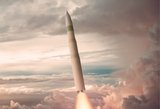US diplomats taken off train in Russian nuclear sub port: reports
Russian authorities removed three US diplomats from a train in an Arctic shipyard city where nuclear submarines are made, news agencies reported on 16 October.
The US State Department confirmed the visit – which according to the reports took place on 14 October – but said the diplomats were on an official trip and had informed the Russian authorities.
Moscow in turn said the diplomats had named a different city as their destination and had ‘obviously got lost’.
In a statement to Russian news agencies, the Russian foreign ministry confirmed ‘that this was an official trip and that they informed the Russian defence ministry of their plans.
‘Only, they said their intention was to visit Arkhangelsk and they ended up en route to Severodvinsk,’ the ministry said, referring to the regional capital around 30km (21mi) away.
Severodvinsk is an Arctic port with a naval shipyard that builds nuclear submarines.
‘They obviously got lost. We are ready to give the US embassy a map of Russia,’ the ministry added sarcastically.
According to the news agency reports, the diplomats taken off a train running to Severodvinsk from Nyonoksa, the site of a missile test blast that saw a radiation spike last August.
The trio, including a naval attache and a defence attache, were removed from the train in Severodvinsk station at around 6:00pm after document checks and then released, Interfax news agency reported.
TASS news agency, citing a source from the law enforcement authorities, said the diplomats were suspected of breaching rules on foreigners visiting controlled zones. Severodvinsk does not allow foreigners to visit freely, TASS noted.
But the US said the diplomats had acted in accordance with the rules.
‘The American diplomats were on official travel and had properly notified Russian authorities of their travel,’ a State Department spokesperson told AFP.
Some Russian cities, particularly those involved in military and nuclear activities, only allow foreigners to visit with special permits.
Nearby Nyonoksa is a missile testing site on the coast of the White Sea. On 8 August, an explosion there killed five people working for Russia's nuclear agency.
The blast briefly caused radiation levels in Severodvinsk to rise to more than 16 times background levels, Russian officials said, while denying any danger to public health.
Relations between Moscow and Washington have been battered by accusations of Russian interference in the 2016 US presidential elections.
Although President Vladimir Putin and US President Donald Trump have sought to improve bilateral ties, they remain strained.
Russia last month hit out at Washington for denying visas to a Russian delegation due to attend the UN General Assembly.
More from Defence Notes
-
![US Air Force pushes Sentinel’s initial capability to early 2030s despite China’s nuclear progress]()
US Air Force pushes Sentinel’s initial capability to early 2030s despite China’s nuclear progress
While the US struggles to modernise the 50-year-old land leg of its nuclear triad, China has been rapidly developing and fielding new nuclear capabilities.
-
![New opportunities for defence firms as EU steps up support for Ukraine]()
New opportunities for defence firms as EU steps up support for Ukraine
The European Commission is looking for startups and other innovators to address challenges across the land, air and sea domains.
-
![Why small guns have been critical to layered CUAS architectures]()
Why small guns have been critical to layered CUAS architectures
Multiple countries have been deploying small arms as the last line of drone defence due to their multiple operational and tactical advantages.
-
![Singapore Airshow 2026: ST Engineering hints at export success for AME assault rifle family]()
Singapore Airshow 2026: ST Engineering hints at export success for AME assault rifle family
The Singapore-based technology company unveiled its new rifle family at this week’s airshow. Chen Chuanren spoke with the ST Engineering’s head of small arms to find out more about how the weapons have been refined.
-
![High tension in the High North – a wake-up call for NATO’s future Arctic defence efforts?]()
High tension in the High North – a wake-up call for NATO’s future Arctic defence efforts?
Any potential ‘Arctic Sentry’ mission would be months in the planning, but with tensions high in the region given the US’s push for Greenland, NATO countries will need to continue to emphasise their commitment to the region, analysts have said.























